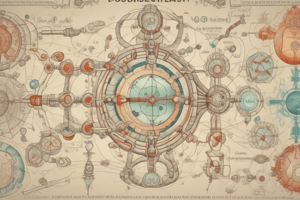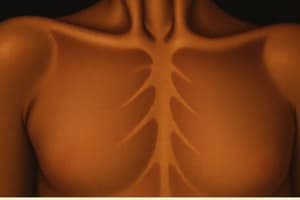Podcast
Questions and Answers
Which group of hormones are lipophilic in nature and mostly derivatives of cholesterol?
Which group of hormones are lipophilic in nature and mostly derivatives of cholesterol?
- Group II hormones
- Paracrine hormones
- Endocrine hormones
- Group I hormones (correct)
Where do Group II hormones bind to perform their functions?
Where do Group II hormones bind to perform their functions?
- In the nucleus
- On the mitochondria
- On the cell surface (plasma membrane) (correct)
- In the cytoplasm
What is the second messenger involved in the action of ACTH, FSH, LH, PTH, glucagon, and calcitonin?
What is the second messenger involved in the action of ACTH, FSH, LH, PTH, glucagon, and calcitonin?
- Unknown
- cAMP (correct)
- Intracrine
- Phosphatidylinositol/calcium
What is the term for the effect of a hormone on a neighboring cell?
What is the term for the effect of a hormone on a neighboring cell?
What is the term for the effect of a hormone on the same cell that released it?
What is the term for the effect of a hormone on the same cell that released it?
What is the function of the hypothalamus?
What is the function of the hypothalamus?
What is the term for the effect of a hormone that travels in the blood to produce a biologic effect on distant target cells?
What is the term for the effect of a hormone that travels in the blood to produce a biologic effect on distant target cells?
What is the newly proposed mechanism of hormone action where a hormone is synthesized and acts intracellularly in the same cell?
What is the newly proposed mechanism of hormone action where a hormone is synthesized and acts intracellularly in the same cell?
What is the primary function of hormones in the body?
What is the primary function of hormones in the body?
How do hormones reach their target cells?
How do hormones reach their target cells?
What is a characteristic of hormones?
What is a characteristic of hormones?
How many endocrine glands produce hormones in the body?
How many endocrine glands produce hormones in the body?
What is the duration of hormone effects?
What is the duration of hormone effects?
What do hormones regulate in the body?
What do hormones regulate in the body?
How do hormones interact with their target cells?
How do hormones interact with their target cells?
What is the relationship between the endocrine and nervous systems?
What is the relationship between the endocrine and nervous systems?
What is the primary way hormones travel through the body?
What is the primary way hormones travel through the body?
Which type of hormone is insulin classified as?
Which type of hormone is insulin classified as?
What is the function of hormone receptors?
What is the function of hormone receptors?
Which gland is responsible for regulating hormone production from endocrine organs?
Which gland is responsible for regulating hormone production from endocrine organs?
What is the term for the movement of substances in and out of cells?
What is the term for the movement of substances in and out of cells?
Which organ is an example of an endocrine gland that secretes hormones directly into the bloodstream?
Which organ is an example of an endocrine gland that secretes hormones directly into the bloodstream?
What is the term for hormones that are synthesized from amino acids?
What is the term for hormones that are synthesized from amino acids?
What is the primary function of the endocrine system?
What is the primary function of the endocrine system?
Flashcards are hidden until you start studying
Study Notes
Hormone Classification
- Group I hormones: lipophilic, mostly derivatives of cholesterol, except T3 and T4; examples: estrogens, androgens, glucocorticoids, calcitriol
- Group II hormones: bind to cell surface receptors, stimulate release of second messengers, which perform biochemical functions; examples: ACTH, FSH, LH, PTH, glucagon, calcitonin
Hormone Effects
- Endocrine effect: hormone released into circulation, travels to distant target cells
- Paracrine effect: hormone released from cell, produces effect on neighboring cells
- Autocrine effect: hormone produces effect on same cell that released it
- Intractine effect: hormone synthesized and acts intracellularly in same cell
Hypothalamus
- Links nervous and endocrine systems to maintain homeostasis
- Integrates hormone production from endocrine organs
Endocrine System
- Made up of several organs called glands that create and secrete hormones
- Hormones control and coordinate body functions, slower to initiate but have more prolonged response compared to nervous system
Hormones
- Defined as organic substances produced by specific tissues (endocrine glands), secreted into bloodstream to control metabolic and biological activities
- Chemical messengers involved in transmission of information from one tissue to another and from cell to cell
- Specific, affecting certain target tissues or organs and regulating their activities
- Regulate processes such as metabolism, fluid balance, growth, and sexual reproduction
- Characteristics: low molecular weight, small soluble organic molecules, high rate of diffusion, effective in low concentration, travels in blood, and specific to target site
Endocrine Signaling
- Hormones travel through bloodstream to reach target cells
- Act on target cells with specific receptor
Endocrine Glands
- Secrete hormones directly into bloodstream, rather than through a duct
- Major endocrine glands include pancreas, adrenal gland, thyroid gland, pineal gland, and gonads (ovaries and testes)
- Examples of endocrine glands: adipose tissue secretes leptin
Studying That Suits You
Use AI to generate personalized quizzes and flashcards to suit your learning preferences.




